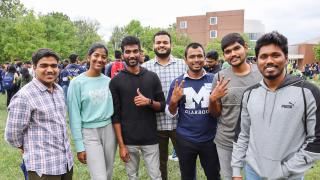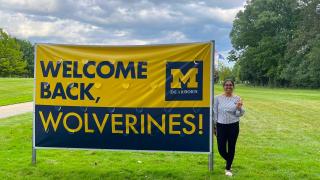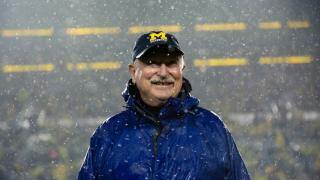
“I practiced and practiced and studied and studied,” he said. “Yeah, I’m good now.”
Al Hadabi is one of what the university hopes will be a growing number of students aided by UM-Dearborn’s English Language Proficiency Program (ELPP). The program recently received an initial five-year accreditation from the Commission on English Language Program Accreditation.
“The Commission on English Language Program Accreditation is the gold standard of ESL accreditation,” said ELPP Coordinator Scott Riggs. “To be one of only five universities in the state to have received the accreditation—and to have received it so quickly—is validation that we’re providing quality services to our students.”
Students like Al Hadabi receive intensive reading, writing and verbal communication instruction. But the program goes much farther than language comprehension, Al Hadabi said. “They help us with our life if we’re having problems. We are like a family. I would suggest for people to come and see this program because it was beneficial.”
UM-Dearborn launched ELPP in 2012 to provide English language support to students who had been provisionally admitted to the university. That is, they met the academic standards to enroll but not the English standards.
Now with accreditation, UM-Dearborn can apply for governmental approval to write Certificates of Eligibility for Nonimmigrant Students for English
Training Programs. This step will allow the university to accept a greater variety of students, as well partner with countries that work only with universities that can write the forms.
“It really is opening up a lot of doors for the university. I anticipate there will be a strong impact on enrollment numbers,” Riggs said.
And a strong international enrollment will prove beneficial to the entire university community, according to Riggs, who said the growth will play a critical role in the university’s metropolitan vision.
“Most of our students have not had an opportunity to travel overseas and quite possibly won’t have a chance,” he said. “We can help bring the world here and prepare all of our students to compete in a global workforce.”




